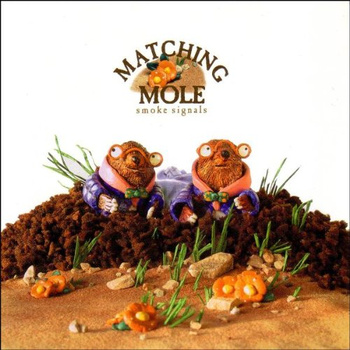Matching Mole was the band formed by drummer/vocalist Robert Wyatt after he left the pioneering UK outfit Soft Machine in July, 1971. Soft Machine were hugely popular in France, and Robert got the name of his new band as a play on the French translation of Soft Machine: Machine Molle. What eventually became the first Matching Mole album was begun as a solo album by Robert in late 1971. Midway through recording, he was joined by guitarist Phil Miller (Delivery, Hatfield & The North, National Health), organist Dave Sinclair (Caravan), bassist Bill MacCormick (Phil Manzanera’s 801) and guest electric pianist Dave MacRae (Mike Westbrook). These recordings became their self titled first album, released in early 1972.
Sinclair left soon after the release of their album, and MacRae joined full time. This quartet performed often throughout Europe, and recorded a second album, Little Red Record, which was produced by Robert Fripp of King Crimson, and which was released in fall,1972. Shortly after the release of Little Red Record, Robert decided that he did not want the responsibilities of being a band leader & broke up the band.
 MARCH RUNE 172 |
In 2001, Cuneiform released Smoke Signals, a collection of unreleased performances. The band was so pleased with that album that when one of the members came across a forgotten live show on tape - identified simply as "March, 1972", they immediately contacted us, and March is the result. Recorded live in Europe 3/72, shortly after Dave MacRae became the keyboardist, this includes the basic repertoire that the band would perform during their lifetime, with a few surprises thrown in. The sound is surprisingly superb for a live show of this vintage, and once again Tom Recchion has come up with a charming cover. "Great sound, great artwork - so thanks once again." - Robert Wyatt |
 SMOKE SIGNALS RUNE 150 |
Smoke Signals compiles all previously unreleased performances - selected & sequenced by Robert Wyatt biographer Mike King - from the band's most intense gigging period. The set list is mostly drawn from Little Red Record, but the way the band performed the pieces live is quite different from the heavily overdubbed versions found on the studio disc. Despite their very short lifetime, Mole developed an individual sound based on the players idiosyncratic musical styles, that was a unique take on fusion and Canterbury musics. |
